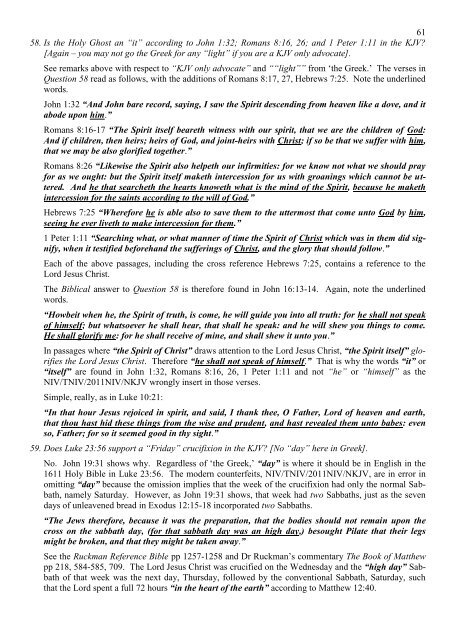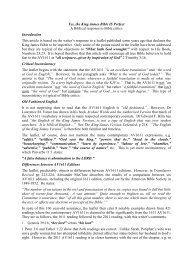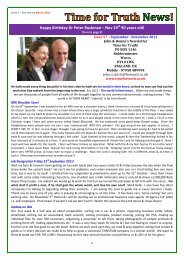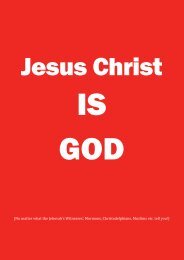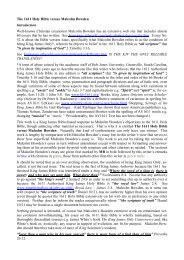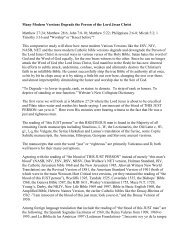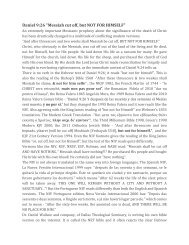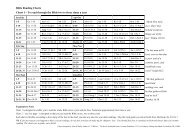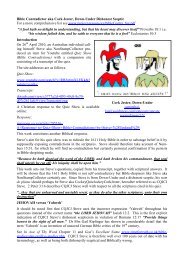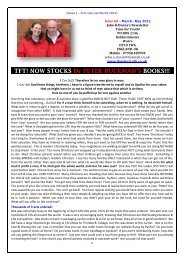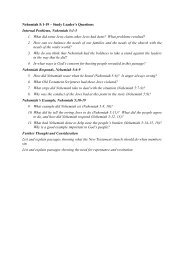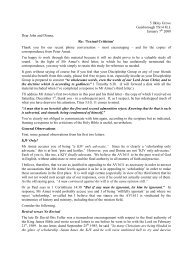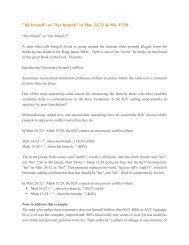A Grievous Wolf - Time for Truth
A Grievous Wolf - Time for Truth
A Grievous Wolf - Time for Truth
Create successful ePaper yourself
Turn your PDF publications into a flip-book with our unique Google optimized e-Paper software.
61<br />
58. Is the Holy Ghost an “it” according to John 1:32; Romans 8:16, 26; and 1 Peter 1:11 in the KJV?<br />
[Again – you may not go the Greek <strong>for</strong> any “light” if you are a KJV only advocate].<br />
See remarks above with respect to “KJV only advocate” and ““light”” from ‘the Greek.’ The verses in<br />
Question 58 read as follows, with the additions of Romans 8:17, 27, Hebrews 7:25. Note the underlined<br />
words.<br />
John 1:32 “And John bare record, saying, I saw the Spirit descending from heaven like a dove, and it<br />
abode upon him.”<br />
Romans 8:16-17 “The Spirit itself beareth witness with our spirit, that we are the children of God:<br />
And if children, then heirs; heirs of God, and joint-heirs with Christ; if so be that we suffer with him,<br />
that we may be also glorified together.”<br />
Romans 8:26 “Likewise the Spirit also helpeth our infirmities: <strong>for</strong> we know not what we should pray<br />
<strong>for</strong> as we ought: but the Spirit itself maketh intercession <strong>for</strong> us with groanings which cannot be uttered.<br />
And he that searcheth the hearts knoweth what is the mind of the Spirit, because he maketh<br />
intercession <strong>for</strong> the saints according to the will of God.”<br />
Hebrews 7:25 “Where<strong>for</strong>e he is able also to save them to the uttermost that come unto God by him,<br />
seeing he ever liveth to make intercession <strong>for</strong> them.”<br />
1 Peter 1:11 “Searching what, or what manner of time the Spirit of Christ which was in them did signify,<br />
when it testified be<strong>for</strong>ehand the sufferings of Christ, and the glory that should follow.”<br />
Each of the above passages, including the cross reference Hebrews 7:25, contains a reference to the<br />
Lord Jesus Christ.<br />
The Biblical answer to Question 58 is there<strong>for</strong>e found in John 16:13-14. Again, note the underlined<br />
words.<br />
“Howbeit when he, the Spirit of truth, is come, he will guide you into all truth: <strong>for</strong> he shall not speak<br />
of himself; but whatsoever he shall hear, that shall he speak: and he will shew you things to come.<br />
He shall glorify me: <strong>for</strong> he shall receive of mine, and shall shew it unto you.”<br />
In passages where “the Spirit of Christ” draws attention to the Lord Jesus Christ, “the Spirit itself” glorifies<br />
the Lord Jesus Christ. There<strong>for</strong>e “he shall not speak of himself.” That is why the words “it” or<br />
“itself” are found in John 1:32, Romans 8:16, 26, 1 Peter 1:11 and not “he” or “himself” as the<br />
NIV/TNIV/2011NIV/NKJV wrongly insert in those verses.<br />
Simple, really, as in Luke 10:21:<br />
“In that hour Jesus rejoiced in spirit, and said, I thank thee, O Father, Lord of heaven and earth,<br />
that thou hast hid these things from the wise and prudent, and hast revealed them unto babes: even<br />
so, Father; <strong>for</strong> so it seemed good in thy sight.”<br />
59. Does Luke 23:56 support a “Friday” crucifixion in the KJV? [No “day” here in Greek].<br />
No. John 19:31 shows why. Regardless of ‘the Greek,’ “day” is where it should be in English in the<br />
1611 Holy Bible in Luke 23:56. The modern counterfeits, NIV/TNIV/2011NIV/NKJV, are in error in<br />
omitting “day” because the omission implies that the week of the crucifixion had only the normal Sabbath,<br />
namely Saturday. However, as John 19:31 shows, that week had two Sabbaths, just as the seven<br />
days of unleavened bread in Exodus 12:15-18 incorporated two Sabbaths.<br />
“The Jews there<strong>for</strong>e, because it was the preparation, that the bodies should not remain upon the<br />
cross on the sabbath day, (<strong>for</strong> that sabbath day was an high day,) besought Pilate that their legs<br />
might be broken, and that they might be taken away.”<br />
See the Ruckman Reference Bible pp 1257-1258 and Dr Ruckman’s commentary The Book of Matthew<br />
pp 218, 584-585, 709. The Lord Jesus Christ was crucified on the Wednesday and the “high day” Sabbath<br />
of that week was the next day, Thursday, followed by the conventional Sabbath, Saturday, such<br />
that the Lord spent a full 72 hours “in the heart of the earth” according to Matthew 12:40.


